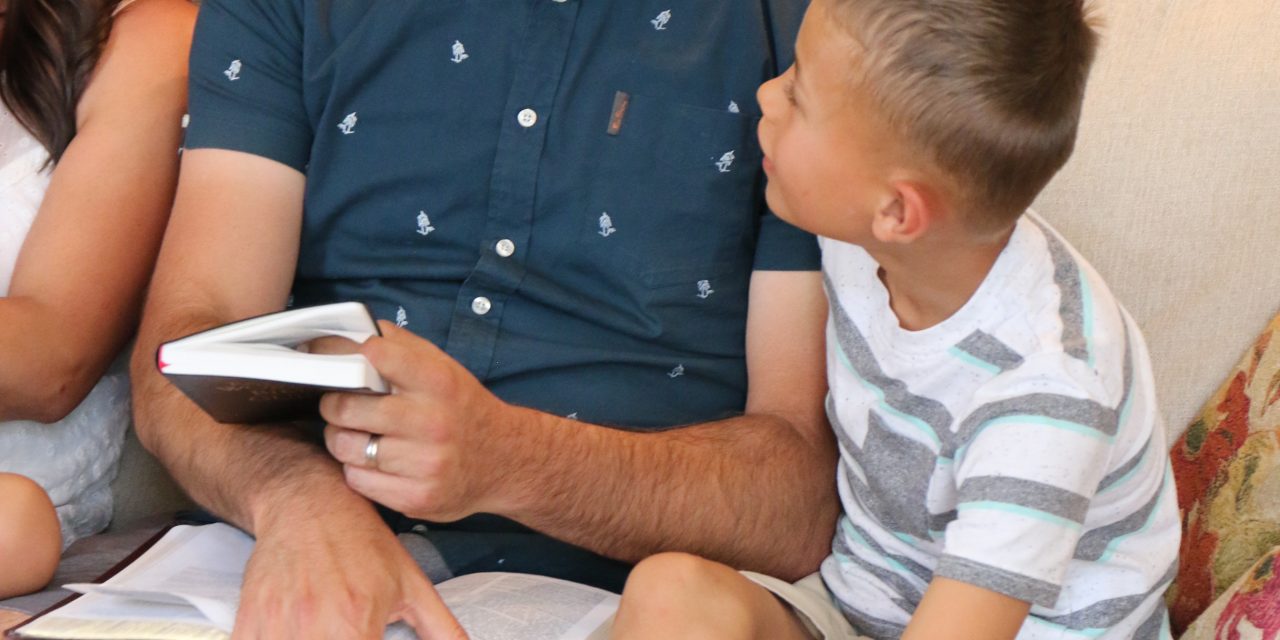by Staff Writer
Imagine your pastor stopping by your house this afternoon to remind you that you’ll be censured by your church sometime soon if you don’t get family worship going. According to Pastor Joel Beeke, this was a practice in Puritan communities (not really very long ago in the scope of history) because family worship was considered a commonplace and primary duty of parents, and specifically fathers.
Family worship has fallen on hard times, but then again, so have many other things recently, such as leaving the house. As Keith Getty says, “In these difficult days when so many people must stay at home, we think there is a tremendous opportunity for families to build new habits.” (See more on pg. 14.)
One of the most important habits to consider developing (or continuing) is family worship. Dr. Beeke, a pastor, professor, and 2020 Repairing the Ruins conference speaker, is committed to re-establishing family

worship because he knows firsthand what it can do.
For my parents’ 50th wedding anniversary, we siblings all agreed to thank mom for one thing and dad for one thing. We all thanked mom for her secret prayer life, which was very powerful. But my dad’s was more unusual. He read Pilgrim’s Progress to us and conducted family worship for all 20 years I was at home. All five of us chose to thank my dad for those amazing times.
My older brother said, “Dad, I want to thank you that I never had to doubt the existence of God. My oldest memory in life is sitting on your lap when I was three years old and you were leading us in family worship. You were weeping as you talked about our souls. And I remember thinking, God is real. So, thank you, Dad.
Thousands of years before the Puritans, Joshua spoke some final words to the Israelites before he said farewell.
Now therefore, fear the Lord, serve Him in sincerity and in truth, and put away the gods which your fathers served on the other side of the River and in Egypt. … Choose for yourselves this day whom you will serve … But as for me and my house, we will serve the Lord. —Joshua 24:14-15
Later in verse 31, we read that the generation after Joshua also knows the works of the Lord and serves Him. According to Beeke, this is one example of how God works in faithfulness from generation to generation, and one of the primary means He can use today to do that is family worship. Beeke provides the following recommendations.
HOW TO PREPARE
Family worship requires some preparation to start. Practically speaking, choosing one or two set times every day will make it easier to follow through (typically after a meal, but you can pick any time that works for you). The most important thing is to do it every day. Like Moses says in Deuteronomy 6, teach your children diligently as you sit down, as you rise up, and as you walk by the way—a Hebrew way of saying to expose your children daily to God’s word.
If you can go to a separate room where everyone has a little space of their own, with enough room to keep their own books and a chair, this can double as a personal devotional area as well. Keep your own Bible, hymns, etc. here so they are easy to access, and decide ahead of time what you’ll cover.
Aim for brevity in family worship. Start with five minutes, especially with younger kids, and move up to 15–20 minutes with older kids. Feel free to let the younger children go play while you talk and pray with your older kids.
Adding time to read stories aloud to your whole family daily or weekly, such as on Sunday evenings, can also create treasured lifelong memories for your kids.
WHAT TO DO
The three most important parts of family worship are reading, praying, and singing.
Reading
 Make a reading plan. If you have older kids, read the whole Bible through and then start again. You can start at the beginning or use a Bible reading schedule (there are many available online for free). For very young kids, pick out stories (Genesis and Jonah are a great source), go through the Gospels, or read the parables or miracles. You could also read from another source for kids, such as The Jesus Storybook Bible (see page 18).
Make a reading plan. If you have older kids, read the whole Bible through and then start again. You can start at the beginning or use a Bible reading schedule (there are many available online for free). For very young kids, pick out stories (Genesis and Jonah are a great source), go through the Gospels, or read the parables or miracles. You could also read from another source for kids, such as The Jesus Storybook Bible (see page 18).
As you read, involve the whole family. Divide up the verses or paragraphs to read aloud, ask questions, and start discussions.
This last part—discussion—sounds simple, but it is where a lot of fathers stumble. As Socratic discussion is foundational to a classical education, so it is for family worship. To help, Beeke got together with a few colleagues and created the Family Worship Bible Guide. Chapter by chapter, this guide highlights main takeaways and questions that you can simply read aloud with your family. Discussions will flow naturally based on these relevant and meaningful topics. Most importantly, these discussions allow you to share stories about how God applied this truth in your life and in the lives of others.
What is the result? According to Beeke, by the time you get to the book of Revelation, you’ve talked about almost every subject under the sun, because the Bible touches on just about every subject under the sun. Your children will have shared the wisdom of your experiences—based on the word of God—on every subject they need to know to live in comfort and to die in peace.
Prayer
Thomas Brooks, a Puritan preacher and author, said, “The family without daily prayer together is like a house without a roof, open and exposed to all the storms of heaven.” So how do you pray? Beeke describes his family’s prayer times:
I always opened in prayer, and then our children prayed, and my wife would close. By the way, my wife and I still do family worship the same way. I open and she closes every night, and we use the Family Worship Bible Guide to discuss the questions, just the two of us.
Keep in mind that five minutes is probably long enough. Be simple in your prayers without being shallow. Follow the ACTS formula: Adoration, Confession, Thanksgiving, Supplication. Be reverent and solemn and be varied. Don’t pray the same things every day. Recall the reading and talking you’ve done as a guide for your prayers. You can also use a prayer list to remember different people and organizations.
Singing
According to Beeke, always end your family worship, as the Puritans would say, with singing—the daily singing of the praises of God.
For more on this topic by Keith and Kristyn Getty, see page 14.
A NOTE ON CONNECTION
Family worship shouldn’t feel burdensome or uncomfortable. Take your young children on your knee so you are eye level with them, and put your arms around them. Talk with older kids about the great truths of the world and let them apply them to their own lives with you. When summing up how your kids should see family worship, Beeke shares this story as the most important thing to remember.
Missionary to New Hebrides (today’s Vanuatu), John Paton had a God-fearing father who consistently led them in family worship. When Paton left home for university he tells us this:
My dear father walked with me the first six miles of the way. His counsel and tears and heavenly conversation on that parting journey are fresh in my heart as if it had been but yesterday; and tears are on my cheeks as freely now as then, whenever memory steals me away to the scene. His tears fell fast when our eyes met each other in looks for which all speech was vain! He grasped my hand firmly for a minute in silence, and then solemnly said: “God bless you, my son! Your father’s God prosper you, and keep you from all evil!”
Unable to say more, his lips kept moving in silent prayer; in tears we embraced, and parted. … I watched through blinding tears, till his form faded from my gaze; and then, hastening on my way, vowed deeply and oft, by the help of God, to live and act so as never to grieve or dishonour such a father and mother as He had given me. … It is no pharisaism, but deep gratitude, which
makes me here testify that the memory of that scene not only helped to keep me pure from the prevailing sins, but also stimulated me in all my studies, that I might not fall short of his hopes, and in all my Christian duties, that I might faithfully follow his shining example.
How much my father’s prayers at this time impress me. I can never explain nor can any stranger ever understand but when on his knees and all of us keeling around him in family worship he would pour out his whole soul in tears for the conversion of the heathen world to the service of Jesus and for every personal need we would all feel as if we were in the presence of the living savior himself and we all learned to love and know him as our divine friend.
It is no coincidence that John Paton gave his life for the gospel. In the face of criticism, death threats, illness, and cannibalism, and after losing his wife and multiple children, he stood firm, persevering to carry that gospel. That was a fruit of the Spirit, blessing the years of family worship in his life.
DR. JOEL R. BEEKE is president and professor of systematic theology and homiletics at Puritan Reformed Theological Seminary, a pastor of the Heritage Reformed Congregation in Grand Rapids, Michigan, editor of Puritan Reformed Journal and Banner of Sovereign Grace Truth, and editorial director of Reformation Heritage Books. He has written and co-authored over one hundred books. His PhD is in Reformation and Post-Reformation theology from Westminster Theological Seminary (Philadelphia). He is frequently called upon to lecture at seminaries and to speak at conferences around the world. He and his wife Mary have been blessed with three children and four grandchildren. This article is a synopsis of a talk given by Dr. Joel Beeke at the 2020 Repairing the Ruins Conference.










